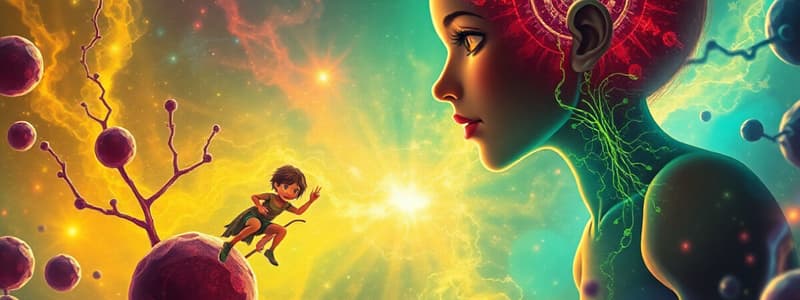Podcast
Questions and Answers
What is the main cause of phenylketonuria (PKU)?
What is the main cause of phenylketonuria (PKU)?
- Defect in kidney transport of cysteine
- Enzyme deficiency in branched chain amino acid catabolism
- Inability to convert phenylalanine to tyrosine (correct)
- Lack of homogentisate dioxygenase
In alkaptonuria, patients can effectively break down proteins to amino acids like tyrosine and phenylalanine.
In alkaptonuria, patients can effectively break down proteins to amino acids like tyrosine and phenylalanine.
False (B)
What is the primary cause of nonketotic hyperglycinemia?
What is the primary cause of nonketotic hyperglycinemia?
- Accumulation of phenylalanine
- Defective tyrosine hydroxylase enzyme
- Defective creatine synthesis
- Defects in the enzyme complex that catalyzes glycine cleavage (correct)
What is a common symptom of cystinuria?
What is a common symptom of cystinuria?
Individuals with nonketotic hyperglycinemia typically live to adulthood.
Individuals with nonketotic hyperglycinemia typically live to adulthood.
The enzyme deficiency in alkaptonuria is __________.
The enzyme deficiency in alkaptonuria is __________.
What are the starting materials in heme synthesis?
What are the starting materials in heme synthesis?
Creatine is synthesized from ______ and glycine.
Creatine is synthesized from ______ and glycine.
Match the following diseases with their characteristics:
Match the following diseases with their characteristics:
Which compound is a catabolic product of creatine?
Which compound is a catabolic product of creatine?
What dietary restriction can help slow the progress of gyrate atrophy?
What dietary restriction can help slow the progress of gyrate atrophy?
Elevated levels of phenylpyruvate are beneficial for brain development in children with PKU.
Elevated levels of phenylpyruvate are beneficial for brain development in children with PKU.
Match the following disorders with their related amino acid metabolism:
Match the following disorders with their related amino acid metabolism:
Catecholamines are synthesized directly from glycine.
Catecholamines are synthesized directly from glycine.
Name one consequence of untreated phenylketonuria.
Name one consequence of untreated phenylketonuria.
Cystine accumulates in the blood and oxidizes to __________, causing calculi.
Cystine accumulates in the blood and oxidizes to __________, causing calculi.
What is the role of dopamine in the brain?
What is the role of dopamine in the brain?
The process of measuring creatinine in urine helps to assess ______ function.
The process of measuring creatinine in urine helps to assess ______ function.
What is typically tested in newborn screenings for PKU?
What is typically tested in newborn screenings for PKU?
Which of the following amino acids is the starting point for catecholamine synthesis?
Which of the following amino acids is the starting point for catecholamine synthesis?
Which of the following disorders is caused by a deficiency in phenylalanine hydroxylase?
Which of the following disorders is caused by a deficiency in phenylalanine hydroxylase?
Tyrosine is synthesized from phenylalanine in a process involving tetrahydrobiopterin.
Tyrosine is synthesized from phenylalanine in a process involving tetrahydrobiopterin.
What are the end products of phenylalanine degradation?
What are the end products of phenylalanine degradation?
Phenylketonuria can lead to severe __________ if left untreated.
Phenylketonuria can lead to severe __________ if left untreated.
Match the following disorders with their associated characteristics:
Match the following disorders with their associated characteristics:
Which amino acid is considered both glucogenic and ketogenic?
Which amino acid is considered both glucogenic and ketogenic?
Alkaptonuria is a result of an inability to metabolize phenylalanine.
Alkaptonuria is a result of an inability to metabolize phenylalanine.
What is the consequence of lysine degradation in metabolism?
What is the consequence of lysine degradation in metabolism?
A common treatment for Phenylketonuria (PKU) is a __________-restricted diet.
A common treatment for Phenylketonuria (PKU) is a __________-restricted diet.
Which coenzyme is essential for the conversion of phenylalanine to tyrosine?
Which coenzyme is essential for the conversion of phenylalanine to tyrosine?
Which condition results from a deficiency in the phenylalanine hydroxylase enzyme?
Which condition results from a deficiency in the phenylalanine hydroxylase enzyme?
Alkaptonuria is characterized by the accumulation of homogentisic acid.
Alkaptonuria is characterized by the accumulation of homogentisic acid.
What neurotransmitter is produced from the decarboxylation of glutamate?
What neurotransmitter is produced from the decarboxylation of glutamate?
A defect in the pathway of __________ synthesis can lead to albinism.
A defect in the pathway of __________ synthesis can lead to albinism.
Match the disorder with its metabolic defect:
Match the disorder with its metabolic defect:
Which of the following substances is derived from tryptophan?
Which of the following substances is derived from tryptophan?
Tyrosine is produced by the hydroxylation of phenylalanine.
Tyrosine is produced by the hydroxylation of phenylalanine.
Which hormone is produced by the thyroid gland that is derived from tyrosine?
Which hormone is produced by the thyroid gland that is derived from tyrosine?
Norepinephrine and epinephrine are often referred to as __________ hormones.
Norepinephrine and epinephrine are often referred to as __________ hormones.
What is the main role of serotonin outside the central nervous system?
What is the main role of serotonin outside the central nervous system?
Flashcards are hidden until you start studying
Study Notes
Phenylketonuria (PKU)
- Individuals with PKU cannot convert phenylalanine to tyrosine.
- This results in high levels of phenylalanine and low levels of tyrosine in the blood.
- Phenylalanine is metabolized to phenylpyruvate instead.
- Elevated levels of phenylpyruvate inhibit brain development.
- Newborns are screened for PKU by testing for elevated levels of phenylpyruvate in the urine or phenylalanine in the blood.
Alkaptonuria
- A genetic disease that affects the breakdown of tyrosine and phenylalanine.
- Caused by a lack of the enzyme homogentisate dioxygenase (HGD).
- Homogentisic acid (HGA) builds up in the bones, cartilage, and urine.
- Characterized by black urine, ochronosis (black bones and cartilage), and degenerative arthritis.
Other Diseases of Amino Acid Metabolism
- Cystinuria:
- Defect in kidney transport of cysteine and basic amino acids.
- Cysteine accumulates in the blood and oxidizes to cystine, forming calculi.
- Treated by drinking large amounts of water or taking compounds that react with cysteine to form soluble derivatives.
- Gyrate Atrophy:
- Defect in ornithine transaminase activity.
- Causes atrophy of the choroid and retina of the eyes.
- Progress can be slowed by restricting dietary intake of arginine or administering pyridoxine.
Fate of Carbon Skeletons After Removal of Nitrogen
- Amino acids are degraded to pyruvate or citric acid cycle intermediates.
- These intermediates can contribute to gluconeogenesis making them glucogenic.
- Amino acids degraded to acetyl CoA or acetoacetate can contribute to the formation of fatty acids or ketone bodies, making them ketogenic.
- Some amino acids are both glucogenic and ketogenic.
Lysine Degradation
- A ketogenic amino acid.
- Saccharophine dehydrogenase (LYS1) is a key enzyme in this pathway.
- Uses NADP+ and glutamate.
Phenylalanine Degradation and Associated Clinical Implications
- Phenylalanine is both glucogenic and ketogenic.
- The enzyme phenylalanine hydroxylase is responsible for converting phenylalanine to tyrosine.
- Phenylketonuria (PKU) is caused by a mutation in the gene encoding phenylalanine hydroxylase.
- The disease is treated by dietary restriction of phenylalanine and supplementation with tyrosine.
Nonketotic Hyperglycinemia (Glycine Encephalopathy)
- Defects in the glycine cleavage enzyme complex lead to an accumulation of glycine in body fluids.
- Causes severe mental deficiencies and often death in infancy.
Amino Acids in the Body
- Amino acids are used in the synthesis of important compounds.
Heme Synthesis
- Glycine and succinyl CoA are starting materials for heme synthesis.
- Deficiencies of enzymes in the pathway can cause porphyrias.
Creatine Synthesis
- Creatine is synthesized from arginine and glycine.
- Catabolic product of creatine is creatinine, excreted in urine.
- Creatinine levels are used to assess renal function.
Catecholamines Synthesis
- Catecholamines are synthesized from phenylalanine and tyrosine.
- Include dopamine, norepinephrine (noradrenalin), and epinephrine (adrenalin).
Catecholamines Synthesis - Clinical Implications
- Dopamine is a neurotransmitter involved in Parkinson's disease.
- Melanin is derived from dopa and synthesized in melanocytes.
- Defects in melanin synthesis result in albinism.
Catecholamines Synthesis - Fight or Flight Hormones
- Norepinephrine (noradrenalin) functions as a neurotransmitter in the brain.
- Epinephrine (adrenalin) is a hormone produced in the adrenal glands and certain neurons.
- Epinephrine plays a role in the fight-or-flight response.
Tyrosine Metabolism Products
- The thyroid gland produces iodinated derivatives of tyrosine: triiodothyronine (T3) and tetraiodothyronine (T4).
Tryptophan Metabolism Products
- The nicotinamide moiety of NAD(P) is derived from tryptophan.
- Serotonin (5-hydroxytryptamine) is a neurotransmitter involved in smooth muscle contraction and vasoconstriction.
- Melatonin is produced by the pineal gland and involved in daily and seasonal rhythms.
Neurotransmitters from Glutamine
- Brain neurons synthesize glutamate through hydrolysis of glutamine.
- Glutamate is an excitatory neurotransmitter.
- Glutamate is decarboxylated to produce γ-aminobutyric acid (GABA), an inhibitory neurotransmitter.
Studying That Suits You
Use AI to generate personalized quizzes and flashcards to suit your learning preferences.




